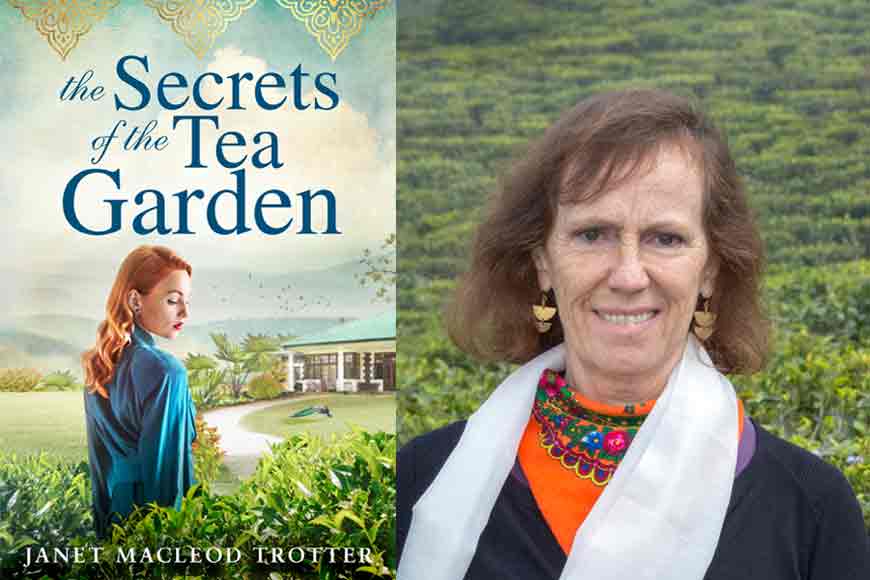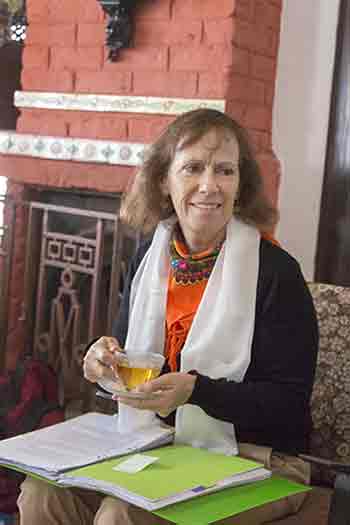GB exclusive interview with British author Janet MacLeod Trotter

Janet MacLeod Trotter is a British author who has more than 20 historical novels to her credit including a series on the Tea Planters of Bengal and Assam under the British era. She will be signing her latest book in Kolkata on 22nd November. She gives an exclusive interview to GetBengal
• Your book is named Secrets of the Tea Garden. Why were you attracted to write on such a theme related to India?
Secrets of the Tea Garden is the fourth novel in the India Tea Series. The series begins in 1904 and looks at the lives of British tea planters in Assam when tea was becoming the most popular drink in Britain. I was interested in following the story of tea from the plantations all the way to Edwardian Britain where it was sold and drunk, and to follow the lives of those involved in the industry. It’s a family generational drama, beginning with heroine, Clarrie Belhaven, an Anglo-Indian tea planter’s daughter who has to leave her beloved India when their tea garden fails and start a new life in England. The series is set in both Britain and India.<
• Is your book a work of fiction? If so, does it carry hard facts about tea gardens of Bengal and India?
Yes, it is fiction but the background covers real events. The Secrets of the Tea Garden is the final in the series and takes the story up to the last days of British rule, Partition and Indian Independence. During the series, various themes are touched on, such as the conditions of the tea pickers, life on the tea gardens and the political turmoil in the lead up to Independence. The novel is dedicated to the people of the Indian Subcontinent who lived through the events of 1947.
 • Which country are you from and how much does Kolkata and India at large mean to you?
• Which country are you from and how much does Kolkata and India at large mean to you?
I am from the UK and of Scottish origin. India is very special to me as I grew up with stories of the country from my mother who lived here as a child. My grandparents were from Edinburgh in Scotland and my grandfather, Bob Gorrie, came to India as a forester with the India Forest Service and worked in Punjab from 1922 until 1950. My grandparents were married in Lahore and my granny would go into camp with my granddad for months at a time, trekking to remote forests and as far as the Tibetan border. When my mother was born, they took her too and she was carried through the Himalayan foothills in a basket on a mule! During the Second World War my granddad also worked in Calcutta and it has been a great thrill to visit the city and learn more about its past and present – and meet some wonderful people.
• Why did you wish to have a book launch in Kolkata?
I’m in India with my husband, Graeme, on the Tea Planter’s Tour – we are giving book readings around the tea growing areas of Darjeeling and Assam, organised by No News, No Shoes. We thought that Kolkata would be the perfect place to finish the tour and launch the novel as a lot of the story takes place in the city. It has always been a special place of learning and books, of poetry and writers, so I feel very honoured to be able to celebrate the publication of the novel here.
• Tea industry in Bengal and also in India is going through a slump, with several tea workers living under poverty line, and many tea estates being closed down. How do you look at this waiting catastrophe?
I’m very saddened to think that the tea industry in India is under stress. It’s a tough job in often remote areas and there is global competition. Some gardens are diversifying with eco-tourism and selling online to try and offer something unique. I think consumers should be prepared to pay more for tea so that gardens can flourish and provide decent wages and conditions. This could happen through adopting the Fair-Trade principles, which some companies do. The solution is not just in the hands of the growers but of those who drink tea!
• Any future plan? Any new books on the anvil?
This is my 23rd book! I have written many historical novels and a couple of mystery novels. One mystery novel, The Vanishing of Ruth, was inspired by an overland bus journey I did when I was eighteen years old, from London to Kathmandu. It was in 1976 and we visited Afghanistan, Pakistan (including Lahore where my family had lived), Kashmir and Northern India. Seeing the Taj Mahal by moonlight was a highlight. The novel is about a young woman who disappears on a bus trip in Afghanistan and the quest of her niece to find out what happened to her. My novel, The Tea Planter’s Bride, is set partly in the Punjab and the background research was helped by my grandparents’ diaries, letters and cine films – my granddad was a keen amateur photographer and took films of logging and forestry for his students at the Dehra Dun Forestry College.
The Girl from the Tea Garden is partly set in Shimla and the surrounding hills – also where my grandparents had lived and trekked. On a visit there four years ago, I was thrilled to discover that the boarding house where they had lodged (Christ Church Lodge) still exists.
My most recent novel, In the Far Pashmina Mountains, is set in Britain and India in the early 19th century. The story I’m working on at the moment is about British in Rawalpindi after the First World War (my grandparents also lived there for a time!) As you can see, India has had a big influence on my writing life.
• Would you wish to return to the tea gardens of Bengal again?
I would love to return! It is not just the tea gardens but the setting of the mountains and the people that make it a special place. Perhaps it’s because my MacLeod side of the family come from the Highlands and Islands of Scotland that I feel at home in the Darjeeling area. I can understand how so many Scots felt at home in the Himalayan foothills.










